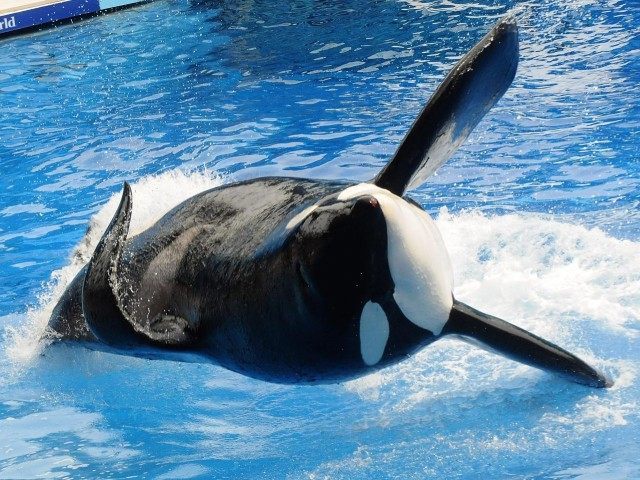CNN re-aired the 2013 documentary Blackfish on Saturday night — just two days after SeaWorld CEO Joel Manby announced that the theme park will surrender to the environmentalists that have aggressively attacked SeaWorld’s orca captivity program, and end both orca shows and captive breeding.
Manby’s open letter, published in the Los Angeles Times, did not explicitly mention the movie. However, subsequent to the release of Blackfish and attacks from groups like People for the Ethical Treatment of Animals (PETA), the park had attendance and financial troubles.
Blackfish was first released in 2013. Left-leaning outlet CNN has played the movie several times since its release. After the network showed the movie in October 2013, CNN’s Anderson Cooper hosted a special discussing it. A special edition of Crossfire also covered Blackfish, bringing on the movie’s associate producer to debate conservationist and zoologist Grey Stafford.
CNN tweeted the Blackfish re-airing details:
Watch the powerful doc that had a profound impact. #Blackfish airs at 10p ET tonight on CNN https://t.co/5h9fsDmR2Y pic.twitter.com/MTRP1pJULf
— CNNFilms (@CNNFilms) March 20, 2016
SeaWorld's orcas will be the last generation at the water parks. #Blackfish airs 10p ET https://t.co/6vE46Q7mwb pic.twitter.com/nZy2nxFniJ
— CNNFilms (@CNNFilms) March 20, 2016
SeaWorld subsequently pushed back on the film, as they have repeatedly before:
Here are over 60 reasons for why you shouldn't believe Blackfish: https://t.co/Fn9QVn7dQP
— SeaWorld (@SeaWorld) March 20, 2016
This is why we chose not to appear in Blackfish: https://t.co/Rh7ALYtw2E
— SeaWorld (@SeaWorld) March 20, 2016
It seems no measure of habitat improvement would placate the leftist environmental activists. In January 2015, SeaWorld announced a massive orca habitat expansion called the “Blue World Project,” which would provide the majestic marine mammals a 10.5 million gallon aquatic habitat. PETA protesters showed up wielding signs: “A bigger prison is still a prison,” “Boycott Seaworld,” “Seaworld: Don’t Renovate! Release!” and “Seaworld Exposed, Watch Blackfish.”
In criticizing the park, Blackfish highlighted the death of SeaWorld trainer Dawn Brancheau. Following Brancheau’s death her family issued a statement that spoke of her belief in the ethical treatment of animals: “Dawn would not have remained a trainer at SeaWorld for 15 years if she felt that the whales were not well cared for.”
In his open letter, Manby defended SeaWorld: “We are proud of contributing to the evolving understanding of one of the world’s largest marine mammals. Now we need to respond to the attitudinal change that we helped to create — which is why SeaWorld is announcing several historic changes.”
Manby went on to describe a new partnership with the Humane Society of the United States. In a conference call the day Manby’s letter was released, a representative for the Humane Society suggested to reporters that the organization could not partner with SeaWorld until certain orca programs were ended.
What the park will stop short of doing is releasing orcas back into the wild where, according to Manby, no killer whale born under human care has ever survived: “For as long as they live, the orcas at SeaWorld will stay in our parks. They’ll continue to receive the highest-quality care, based on the latest advances in marine veterinary medicine, science and zoological best practices.”
SeaWorld’s stock took a dive in August 2014. The drop was attributed at least in part to the Blackfish movie. With heightened attention to the orca issue, California’s elected officials proposed legislation, which was never passed, to kill the park’s orca operations.
In the approval process for the Blue World habitat expansion, SeaWorld faced a block from the regulatory California Coastal Commission. Approval of the massive expansion project was made on condition that the park would end orca breeding. Shortly afterwards, SeaWorld announced that it would modify its iconic orca shows.
Follow Michelle Moons on Twitter @MichelleDiana

COMMENTS
Please let us know if you're having issues with commenting.